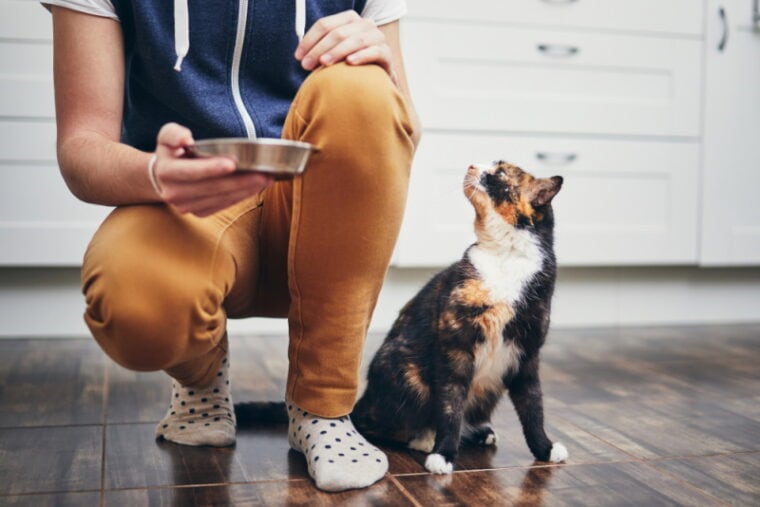
The pet food industry is booming, with billions of dollars in sales every year in the United States. With so many options to choose from, it is easy to feel overwhelmed when trying to find the best food for your feline companion!
Breed-specific diets for dogs and cats are increasingly popular and may seem to simplify the decision. However, most of the cats owned in the United States are mixed breeds. Less than a third are reported to be purebred, and only 3-4% of cats are purchased from a breeder. Considering this, breed-specific diets may appeal to more dog owners than cat owners.
Veterinary nutritionist, Dr. Cailin R. Heinze, brings up some great points about breed-specific foods in this article. She emphasizes that, when selecting a diet for our cats, we should consider their individual nutritional requirements rather than just assume a certain food will meet their needs simply because it is marketed for their breed.
Some cats may do well on a breed-specific diet, but it is not necessary for good health.
Things to Keep in Mind When Choosing Your Cat’s Food
1. Do You Have a Kitten, Adult Cat, or Senior Kitty?
Cats have different nutritional needs at different stages of life.
Kittens should be fed a diet specifically formulated for growth, regardless of their breed. They are also developing taste and texture preferences that may last for their whole life, so be sure to offer a variety of flavors and include both dry and wet food (including smooth and chunky styles). Veterinarians often recommend switching from kitten to adult food around 8-10 months of age.
For most healthy adult cats, the primary nutritional goal is to keep them in ideal body condition. Offer measured amounts of dry and wet food throughout the day to ensure your cat meets (and does not exceed) the daily calories recommended by your veterinarian. A breed-specific diet could be appropriate at this stage, providing your cat does not have any medical concerns.
Senior cats (over the age of 10 years) have increasing energy and protein requirements as they get older. They are also more likely to develop medical conditions like chronic kidney disease (CKD), and your veterinarian may recommend transitioning to a prescription therapeutic diet. Breed-specific diets may be less likely to meet the needs of cats in this stage of life.
2. Does Your Cat Need Help Achieving or Maintaining Their Ideal Body Condition?
It is well-established that cats who maintain their ideal body condition have lower risk of developing certain diseases (e.g., diabetes) than overweight cats, and they may even live longer! When it comes to managing your cat’s weight, their breed is generally less important than their lifestyle and activity level.
Ask your veterinarian to show you how to assess your cat’s body condition score (BCS) so you can monitor it at home. You may also wish to consider weighing your cat regularly (e.g., monthly), so that you will catch any changes right away.
It is important to note that cats should never lose weight quickly, as this can be dangerous for their health. Always consult your veterinarian before implementing a weight loss program for your cat.
Make sure you’re feeding your cat the right type of food for their lifestyle, check out our cat food calculator here:
The exact amount of calories an individual animal needs to maintain a healthy weight is variable and influenced by many factors including genetics, age, breed, and activity level. This tool is meant to be used only as a guideline for healthy individuals and does not substitute veterinary advice
3. What Are Your Cat’s Personal Preferences?

Cats are notoriously finicky eaters. They often have strong preferences when it comes to flavor, moisture content, texture, and even kibble shape! Some cats will accept eating the same thing every day, while others demand variety.
It can be frustrating to spend time and energy researching the best diet options for your cat, only to have them turn up their nose at the food you bring home. Similarly, there is no guarantee that your cat will prefer a certain diet just because it is marketed to their breed.
It may take some trial and error to determine your cat’s favorite food(s), and their preferences may change over time. If you are having trouble finding a diet that your cat enjoys, ask your veterinarian for suggestions.
It is important to note that, if you notice a decrease in your cat’s appetite, or if they refuse to eat for more than 12-24 hours, they should be examined promptly by a veterinarian to rule out any medical issues.
4. Does Your Cat Have Any Food Sensitivities or Medical Conditions?
Cats can have allergies and food intolerances just like people, although true food allergies are not considered to be common. Veterinarians do not generally recommend avoiding certain ingredients in pet food unless they suspect your cat is having an adverse reaction to a particular protein or carbohydrate. Feeding a breed-specific diet does not decrease the likelihood of adverse food reactions.
Certain medical conditions have well-defined nutritional requirements—for example, feline chronic kidney disease (CKD). Affected cats often benefit from a prescription therapeutic diet, and a breed-specific food may not be appropriate.
Conclusion
For most healthy cats, feeding a breed-specific food is not likely to be harmful. However, the most important thing to consider when choosing a diet is whether it meets the unique needs of your individual cat. Your veterinarian can help you define the nutritional goals for your cat and suggest appropriate diets.
If you are interested in more information, check out the World Small Animal Veterinary Association (WSAVA) Global Nutrition Committee’s guidelines for selecting pet foods. They offer questions to help you assess diets (and pet food companies) more objectively. They also answer Frequently Asked Questions (FAQs) about pet food here.
Featured Image Credit: Jaromir Chalabala, Shutterstock







